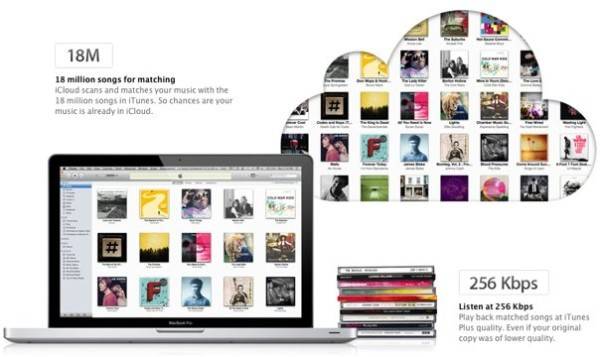There was a lot of buzz prior to today’s announcements at WWDC about the deals that Apple had reportedly struck with the major record labels. Even before any Apple executives took the stage, many industry observers had crowned Apple the heir apparent to music in the cloud, decreeing that its offerings would surely trump those recently announced by Google and Amazon.

But now that the dust has settled and the glimmer has faded from today’s keynote at WWDC, we have to ask, has Apple really triumphed here? Did we see the future of digital music unveiled onstage?
What Apple Announced
There are several pieces to the Apple and iTunes music strategy going forward, including the following:
- The introduction of iCloud: Free (yay!) as part of iOS 5, iCloud will allow users to give users access to their music (and other files) across devices, including iPhones, iPads, iPod Touches, Macs and PCs.
- iTunes in the Cloud: As part of iCloud, users will be able to buy music through iTunes and have it stored in the cloud.
- WiFi Syncing: Again, as part of iOS 5, devices will be able to sync over wireless and your iDevice will sync and backup to the iCloud without your having to plug in an annoying white cord.
- iTunes Match: This new service, announced as the famous “one more thing” at today’s keynote, will allow users to store their music in the cloud, even if they haven’t purchased their music from iTunes. If iTunes scans your library and finds a match, it will make that song available through iCloud, for $25 a year. Says Apple “all the music iTunes matches plays back at 256-Kbps iTunes Plus quality – even if your original copy was of lower quality.”

“This Changes Everything!” – Except Not Really
At first blush, the thought of having your entire music collection available through iCloud sounded like an amazingly awesome deal. And for those of us who have amassed large record collections outside of the iTunes marketplace, it felt as though we were being pardoned for sins against the $.99 download – whether we came across our mp3s through ripping, legal filesharing, or piracy.
But it’s important to note that Apple’s new offer does not involve music streaming. True, you can have your music collection synced across devices (up to 10 of them). But you will still have to download the music you want to play on to your iPhone or iPad or iPod Touch or Mac. You won’t be able to access your entire collection and randomly shuffle between all the glorious gigabytes.
And so Google and Amazon breathe a sigh of relief, because when it comes to music storage in the cloud, Apple’s offering is “nice, but not revolutionary,” as Evolver.fm’s Eliot van Buskirk observes. Google offers streaming (via the Web, for free, for some of your collection) but no marketplace. Amazon offers streaming (via the Web, for a cost per GB) and a marketplace. Apple offers storage (cheaper than Amazon’s) and one helluva marketplace – but no streaming. In other words, music in the cloud is still very much up for grabs.
The Future’s So Bright, I Gotta…
There are at least 2 camps when it comes to music. The first has amassed a sizable music collection and, whether it’s all digitized or not, wants to be able to to tap into those songs and listen to them anytime, anywhere. The second is less concerned with music ownership and is content to subscribe to some of the latest music services. It’s the benefit of “anytime, anywhere” without the burdens of ownership, without worrying about buying new shelves to hold your records or more storage space to hold the mp3s.
The problem faced by the first camp – the one that admittedly I find myself in – is that that collection of music is so large and eclectic that it’s impossible to put on an iPhone or iPad and if stored locally takes up a goodly portion of a PC hard drive. If you store it externally, there’s always the problem of syncing and access and streaming. I think Apple believes that it’s targeting that market with its announcement today. Your digital music can now be stored in the cloud and you can choose to download songs and playlists as you deem fit.
But as EchoNest’s Paul Lamere points out, “This is not the iCloud I’m looking for.” Like many, Lamere believes that the future lies in subscription music services, and he sees Apple’s decision to build simply a glorified music locker as a failure of imagination. With the record labels willing to make a deal (or so it seemed), why do we not have an iTunes subscription option?
After all, more and more, people are turning to subscription services like Rdio or MOG to fulfill their music-listening needs. People without a vast record collection (and some who are sick of having to purchase new copies every time the music format du jour changes) are opting to rent rather than own their songs. (See Sarah Perez’s recent article on whether or not these sorts of services are “worth it“.)
I Still Haven’t Found What I’m Looking For
Apple’s promise of amnesty for non-iTunes purchases may appear to be a nod towards those of us who’ve acquired our music (cough) elsewhere, but I have to wonder if the same sorts of complaints about subscription services – they don’t have my eclectic, hipster tastes, man! – will also plague iTunes Match.
With all the buzz leading up to WWDC, I think many music fans were waiting for Apple to announce something that really changed the game when it came to our music experiences. It doesn’t seem as though we heard that on stage today.

















